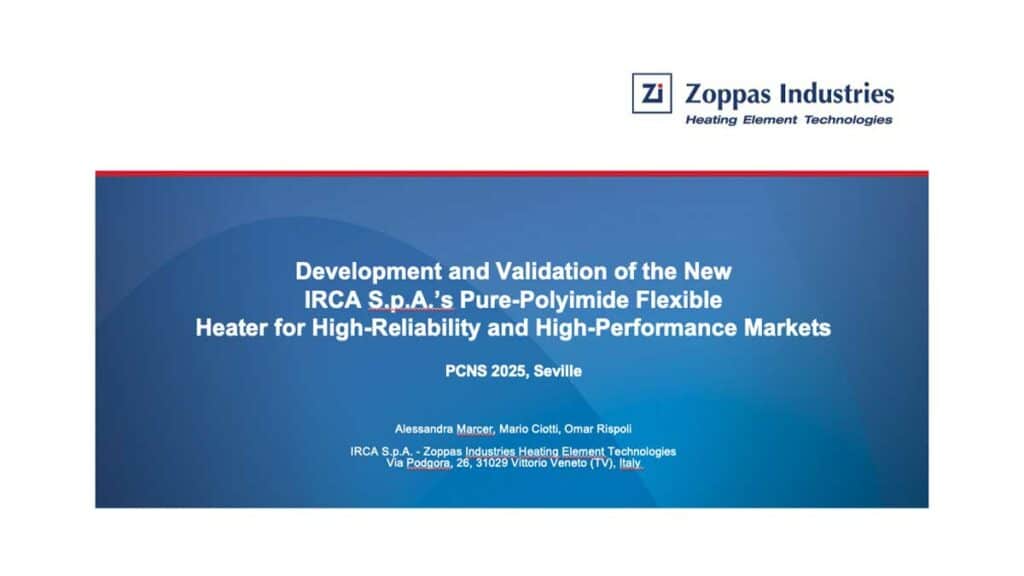The paper “Development and Validation of the New IRCA S.p.A.’s Pure-Polyimide Flexible Heater for High-Reliability and High-Performance Markets” was presented by Mario Ciotti, IRCA S.p.A. – ZIHET, Vittorio Veneto, Italy at the 5th PCNS Passive Components Networking Symposium 9-12th September 2025, Seville, Spain as paper No. 2.5.
Introduction
The development of IRCA S.p.A.’s Pure Polyimide Heater (PPH) represents a significant advancement in flexible heater technology for high-reliability and high-performance applications.
Traditional flexible heaters using FEP or acrylic adhesives are limited by the maximum operating temperature of their adhesive and insulator layers. PPH eliminates these internal adhesive layers, enabling increased power density, higher operating temperatures up to 260°C, superior radiation resistance, and minimal outgassing.
This innovation supports demanding sectors such as medical, aerospace, scientific research, and semiconductors.
Key Points
- Innovative Design: PPH removes internal adhesives, achieving ultra-thin construction (minimum 0.05 mm) and enhanced thermal performance.
- High Performance: Capable of operating at up to 260°C with low outgassing and superior radiation resistance.
- Versatile Applications: Proven through case studies in medical devices, synchrotrons, and semiconductor testing.
- Direct Lamination: Enables adhesive-less integration onto heatsinks for better thermal transfer and higher reliability.
- Validation and Certification: Tested through cross-sectional analysis, thermal aging, cycled life tests, and UL certification; ESA qualification is in progress.
Extended Summary
The IRCA Pure Polyimide Heater is designed to exceed the capabilities of standard flexible heaters by removing the internal adhesive layers that typically limit thermal and mechanical performance. This design reduces thermal mass and achieves extremely low thickness, improving heat transfer and allowing for higher power density in compact applications.
PPH was validated through demanding case studies in diverse fields. In medical devices, such as real-time PCR systems, the technology demonstrated exceptionally low outgassing—four times lower than previous epoxy-based solutions—ensuring compliance with strict contamination requirements. The heater also enabled precise thermal cycling and integration with black polyimide films to reduce unwanted reflections, critical in optical applications. In pharmaceutical aseptic tube sealing, PPH addressed delamination issues at elevated temperatures, improving device reliability and longevity.
In scientific research, PPH showed exceptional radiation resistance, making it suitable for synchrotron facilities where traditional FEP heaters degrade under high-radiation conditions. For semiconductor testing, the heater’s high specific power and thermal efficiency addressed the sector’s stringent requirements for reliability under extreme conditions.
The product’s technical advantages include modular design options (single/double circuits, embedded sensors, metal layers for heat distribution), direct lamination onto heatsinks, and compatibility with curved surfaces. Extensive validation involved cross-sectional SEM analyses, glow wire tests, cycled life testing over 2,000 hours, and passive thermal aging. The heaters maintained structural integrity and functional performance even after exposure to high temperatures, with only minor visual aging effects. Internal validation was complemented by UL certification for safety and flammability (UL 94 V0), and ESA qualification for space applications is underway.
By leveraging European supply chains, PPH aligns with ESA and European Commission goals to establish a certified, locally sourced solution for advanced flexible heaters. The technology supports future space missions, especially those requiring high-temperature resilience, radiation tolerance, and miniaturized payload integration.
Conclusion
IRCA’s Pure Polyimide Heater delivers a transformative step in flexible heating solutions by combining ultra-thin construction, high thermal stability, and low outgassing into a single platform. It meets the stringent demands of medical, scientific, and aerospace markets, offering superior reliability, easier integration, and compliance with sustainability and safety standards. With extensive testing, UL certification, and forthcoming ESA qualification, PPH is poised to become a critical component for next-generation high-performance and high-reliability applications.
